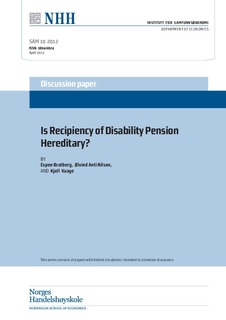| dc.contributor.author | Bratberg, Espen | |
| dc.contributor.author | Nilsen, Øivind Anti | |
| dc.contributor.author | Vaage, Kjell | |
| dc.date.accessioned | 2013-03-13T08:55:33Z | |
| dc.date.available | 2013-03-13T08:55:33Z | |
| dc.date.issued | 2012-04 | |
| dc.identifier.issn | 0804-6824 | |
| dc.identifier.uri | http://hdl.handle.net/11250/163414 | |
| dc.description.abstract | This paper addresses whether children’s exposure to parents receiving disability benefits induces a higher probability of receiving such benefits themselves. Most OECD countries experience an increasing proportion of the working-age population receiving permanent disability benefits. Using data from Norway, a country where
around 10% of the working-age population rely on disability benefits, we find that the amount of time that children are exposed to their fathers receiving disability benefits affects their own likelihood of receiving benefits positively. This finding is robust to a range of different specifications, including family fixed effects. | no_NO |
| dc.language.iso | eng | no_NO |
| dc.publisher | Norwegian School of Economics, Department of Economics | no_NO |
| dc.relation.ispartofseries | Discussion paper;10/2012 | |
| dc.subject | disability | no_NO |
| dc.subject | intergenerational correlations | no_NO |
| dc.subject | siblings fixed effects | no_NO |
| dc.title | Is recipiency of disability pension hereditary? | no_NO |
| dc.type | Working paper | no_NO |
| dc.subject.nsi | VDP::Social science: 200::Economics: 210::Economics: 212 | no_NO |
